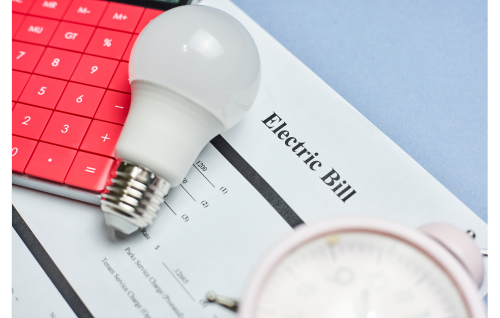There’s been a lot of debate lately about gas versus electric cooking ranges. The evidence is actually pretty clear on that—electric is both healthier for us and better for the environment.1 But that’s not my focus for this post. Even if your oven and stove are electric, your carbon footprint and electric bill are higher than they need to be. An easy fix? Use small appliances whenever you can.
Small appliances use less energy
You can figure out how much energy an appliance uses by looking at its wattage. Multiply the number of watts by the number of hours it’s used each day and divide by 1,000 (1 kW = 1,000 W). This gives you the total kilowatt-hours used by that appliance. Kilowatt-hour (kWh) is the number utility companies use to calculate your monthly electric bill.
Stove-top energy use depends on the size of the burner you’re using. Small ones use about 1,200 watts and large can use as much as 2,500.2 Ovens require more power: up to 5,000 watts.
An air fryer is going to be somewhere between 1,000 and 1,700 watts, depending on the size of the unit. An Instant Pot is going to be about 1,000 watts (or one kilowatt). Both are way less than the 5,000 watts used by an oven. So if you were to cook something for the same amount of time in a large air fryer as you do in the oven, you would be using about one-third as much electricity. In a small air fryer or Instant Pot, it will be about one-fifth as much.
They cook food faster
Not only are you using less electricity by using the small appliance instead of the oven, you’re also cooking for a shorter period of time. The air fryer circulates hot air in a small space, making it highly efficient. This is why you can cook something in the air fryer much faster than in the oven. The Instant Pot’s high pressure similarly speeds up cook time considerably.
Take a baked potato, for instance. If you wanted to bake it in the oven, you would need to preheat the entire oven for at least 10 minutes before putting the potato in for an hour. That’s 5 kW x 1.17 hours = 5.84 kWh.3
With the Instant Pot, you could cook that same potato in about 34 minutes plus time to depressurize4 (when the unit is no longer drawing power). That’s 1 kW x 0.57 hours = 0.57kWh.5 That’s a HUGE difference—one-tenth as much energy for the same amount of food!
You’ll see the difference in your electric bill
The average price for electricity across the entire United States is 16.43 cents per kWh.6 There’s a huge range from state to state, with Utah charging the lowest at 11.01 cents/kWh and Hawaii charging the most at 44.14 cents/kWh. But let’s use the average. Baking those potatoes in the oven would cost just under a dollar.7 Baking them in the Instant Pot would cost just $0.09.8 If you can’t reduce your grocery bill these days, you can make up for it by how you cook your food.
There are obviously going to be times when you need a full-sized oven or a proper stove to prepare a meal. But in the summer, when electric bills are already high, this is a great way to trim your utility costs back a bit. It also avoids heating entire rooms while cooking, which will lower those electricity costs even more.
If you like One Simple Thing, please forward to a friend who might be interested in taking steps toward a healthier planet!
Wetzel, Corryn. Gas stoves are worse for climate and health than previously thought. Smithsonian Magazine. February 1, 2022. https://www.smithsonianmag.com/smart-news/gas-stoves-are-worse-for-climate-and-health-than-previously-thought-180979494/
Beach, Emily. How many watts does an electric stove use? Hunker. https://www.hunker.com/12196042/how-many-watts-does-an-electric-stove-use
5,000 watts = 5 kW and 70 minutes = 1.17 hours
Amy + Jacky. Instant Pot Baked Potatoes. December 17, 2020. https://www.pressurecookrecipes.com/instant-pot-baked-potatoes/ I use this recipe—it’s great!
1,000 watts = 1 kW and 34 minutes = 0.57 hours
U.S. Energy Information Administration. Electric Power Monthly: Average price of electricity to ultimate consumer by end-use sector. https://www.eia.gov/electricity/monthly/epm_table_grapher.php?t=epmt_5_6_a
5.84 kWh x $0.1643/kWh = $0.96
0.57 kWh x $0.1643/kWh = $0.09




